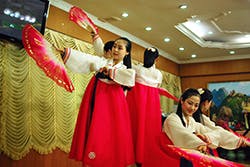How many journalists have been assaulted by North Korean bodyguards while conducting a video interview with a king in a country far from Pyongyang?
In 1997, in Siem Reap, Cambodia – a nation that normally provides a far more hospitable reception to foreign media than the frosty atmosphere and total censorship of North Korea – it happened to me.
One of more bizarre facts about the life of Norodom Sihanouk, the recently deceased king of Cambodia (whose many talents included that of film director, gourmet and singer) is that from 1991, he made the rather odd choice of placing his faith in a security team made up of twelve North Korean bodyguards.
The Pyongyang special guard was a gift from the all-wise Kim Il-Sung, dear leader and founder of the North Korean communist state.
The Cambodian king had then just launched a restoration project for one of the many temples, adjacent to the great majestic wonder of this grand temple complex, Angkor Wat.
Unusual for a king, he happily gave a short press conference with one of his coterie of North Korean bodyguards, who thoughtfully protected the ebullient monarch from the sun by holding aloft an umbrella.
Not perhaps, you might think, a task that comes naturally to an emissary of the Korean Workers State, where all princes, princesses and idle aristocrats were dispensed with long ago.

This scribe had also filmed the event and after the press conference broke up, I conducted the classic ‘ambush interview’ as the king was departing, escorted by four of his stocky and well-built guards.
The affable and talkative Sihanouk responded positively to my questions _ talking while still walking in my direction. I was obliged to walk backwards as the not so affable North Korean protectors moved in with belligerent jabs and shoves, pushing me away from the advancing monarch.
My subject was apparently oblivious to the scuffles happening right in front of him. No thanks to Kim Il Sung’s thugs, I lived to report another day of many curiosities in the Kingdom of Cambodia.
King Sihanouk had long developed a special relationship with the dear leader from North Korea. While kings and communist leaders don’t normally strike up such a warm attachment with one another, they were both used to being absolute rulers of their respective fiefdoms in the 1960s, but with Sihanouk obtaining significantly higher marks for his brand of benevolent despotism, rather than Kim’s totalitarian darkness.
Now, after the recent cremation of his majesty, the twelve unemployed North Korean bodyguards have been sent home by their embassy.
Phnom Penh’s Pyongyang Night Out
A more appealing face of North Korea is on show at the Pyongyang Restaurant (10 Street 200, Tel: 023 216 002) in Phnom Penh, with another branch in Siem Reap. Smiling waitresses in traditional Korean costumes first serve the customers and then disappear en bloc, to reappear on stage playing musical instruments and Korean songs. And I was relieved to see not a single North Korean bouncer or bodyguard in sight!

Busloads of South Korean tourists throng these eateries every day to hear traditional ballads, enjoy kimchi and warmly fraternise with northerners as if reunification was just around the corner.
Meanwhile, back in the Korean DMZ (demilitarised zone), the threat of war buzzes on as Kim Jong-Il and his propaganda machine threaten to annihilate the south and their US ally.
But here in Cambodia, the Pyongyang Restaurant is an oasis of reconciliation through romantic music and good food. If music be the food of peace then play on! Perhaps a peace agreement to end the 1951 Korean War could finally be signed over well-pickled kimchi in Phnom Penh.
The Pyongyang Restaurant chain, owned by the North Korean regime, plans to open more outlets in Bangladesh, Dubai, Laos and Nepal to raise hard currency. Another irony for a nation that periodically continues to suffer from famine, frequently depending on food aid from abroad.
The KGB in Sihanoukville
The town of Sihanoukville, named of course after Cambodia’s King Sihanouk, is a popular laid back beach resort adorned by several unusual attractions.
One of these attractions is Snake House Restaurant (Soviet Street, Victory Beach Road, Tel: 012 673 805). Snake is not on the menu, but diners eat in an ambience of cobras, pythons and other reptiles in surrounding cages.
Set up by a Ukrainian herpetologist who arrived in Cambodia 20 years ago, Snake House offers Russian food and its adjoining hotel caters to Russian tourists. Ostrap, the blond-haired son of the owner, provides the KGB connection and is the proud owner of a Hummer with KGB number-plates, which is clearly designed to impress.
It certainly seems to have impressed the Cambodian authorities, as a Russian resident reported that Ostrap is a member of the KGB fanclub, and has also just been promoted, and now ranks as a Cambodian police colonel.
While Colonel Ostrap speaks fluent Khmer, it is not exactly clear how a foreign citizen can become inducted into the Cambodian police force, unless his role is to hunt down the Russian mafia in these parts, of which there are a growing number.
The same Ukrainian-Russian group that set up the Snake House has also made their mark with a high-flying Antonov disco called The Airport Disco (Soviet Street, Victory Beach Road, Tel: 034 934 470). No, Antonov is not the name of the DJ, but an Old Russian plane. The Antonov 24 used to fly domestic routes in Cambodia, but is now permanently grounded on Victory Beach with a disco built around it. It is probably the only such club in the world.

A far more conventional Russian influence in Cambodia, dating back to the days of the USSR, is the delicious Russian cuisine served up by Irina – a wonderful chef who hails from Tashkent – at her Irina Restaurant (House 15, Street 352) in Phnom Penh.
Another quirk of the Cambodian capital is the little-known survival of the Bulgarian embassy, remaining long after its useful diplomatic functions have ceased to be useful. Back in the days of UN peacekeeping in 1992 and 1993, Bulgaria sent a peace-keeping battalion to serve with the UN.
After 1993, nearly all the Eastern European embassies closed down with the end of the cold war, but not the jolly Bulgarians. Well, back in Sofia they did threaten to close it, but the enterprising Charge D’affaires decided to reinvent the embassy and its swimming pool, a fine bit of real estate with apartments available for rent to various NGO people. Today, the not so busy Bulgarian embassy – apart from Bulgarian wine there is not much trade and Cambodians are not exactly clamouring for Bulgarian visas – continues to survive, with very little budget from the homeland.
So, dear readers, when you are bored with Bangkok, tranquillised by the endless shopping plazas of Singapore, and too sunburnt for another trip to the islands, why not opt for something a bit more unique: a chance to savour the eccentricities, communism-inspired and otherwise, of good old Cambodia?
Tom Fawthrop is a foreign correspondent who first visited Cambodia on Christmas Day 1980, less than two years after the Killing Fields regime had been booted out of power. He is the co-author of a book titled ‘Getting Away with Genocide? Elusive Justice and the Khmer Rouge Tribunal’.
